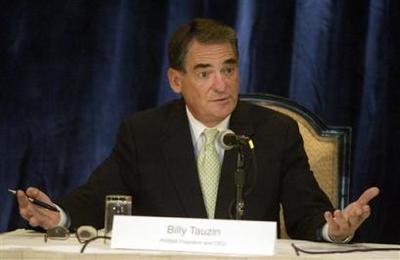
Whats wrong with the Medical Profession??
Billy Tauzin, the former Republican Congressional Representative from the Great State of Louisiana, and who turned down an offer to become the replacement for Jack Valenti, the obvious democrat party member who currently represents the Motion Picture Association, and who is now the head guy over at the Pharmaceutical Research and Manufacturers of America, is mentioned in my local newspaper's editorial column today, as shown below. Senate Majority Leader, Bill Frist, (R-TN), a physician, himself, has been at odds with Tauzin over the content of several proposals, and now our daily rag has taken up the torch, to respond with a veiled attempt to show support in some direction. I've also responded to this editorial, with a slightly different take on the issue. Enjoy:
Published in The Daily Nonpareil, Council Bluffs, Iowa, Sunday, August 07, 2005:
Sunday's Our View
Pressing mute button on ads
OurPosition: Frist is right to push for moratorium on drug spots
Unless you ignore television entirely, you've almost certainly noticed it: Drug advertising has been exploding. In 2004, the industry spent $4.02 billion on advertising, up 23 percent from 2003 and 62 percent from 2002. And, as with many explosions, there are helpless victims.
Pharmaceutical ads have been under an intense spotlight since Merck & Co. removed its pain reliever Vioxx from the market last year in the wake of a study that found the drug doubled patients' risk of heart attacks and strokes. Vioxx was heavily marketed, and doctors say the ads pushed many patients who really didn't require the pricey drug to take it, potentially exposing them to dangerous side effects.
Last month, U.S. Senate Majority Leader Bill Frist, R-Tenn., called for a two-year moratorium on advertising new drugs, saying commercials drive up health care costs.
In an effort to stem the tide of complaints, the pharmaceutical industry unveiled new guidelines last Tuesday for the consumer marketing of medicines, including pledges to educate doctors before beginning consumer campaigns and more clearly outline the risks involved in taking prescription drugs.
Billy Tauzin, president and CEO of the Pharmaceutical Research and Manufacturers of America, said the promise to put off consumer advertising while doctors learn about drugs is the most important of the 15 principles included in the guidelines. But he said mandating a specific time restriction, as suggested by Frist and others, didn't make sense, noting it could hold back information ads on lifesaving drugs.
Critics responded that the voluntary code is toothless, and that many of its principles - such as presenting information that is accurate and not misleading - are already required by law. Adding even more validity to the critics' complaints, the industry will not sanction any company that violates the guidelines.
If the industry was sincere about ending misleading advertising it would use its considerable clout to work with Congress to ensure the Food and Drug Administration has adequate resources to police the industry's current campaigns, Rob Schneider, director of Consumers Union's prescription drug reform effort, told the Associated Press.
Dr. Sidney Wolfe, the director of Public Citizen's Health Research Group, was even more blunt: "They (the guidelines) are designed as a desperate attempt to fend off real regulation of drug ads."
Given the guidelines' lack of sanctions for violations, Wolfe, in our opinion, makes an all too valid point. Frist, too, himself a doctor, was not overly impressed by the guidelines. He said he still wishes they included a moratorium on new drug ads.
We think he should add that to his congressional "to do" list.
***************************************************
Here's my response, sent Sunday Morning for the edification of their editorial staff:
I'm so happy you chose this topic. You're exactly correct that there is a terrible state of affairs within the medical profession. These drug companies have proportional marketing budgets that allow them to do one of two things:
1.) They can offer television networks, and their affiliates,Americans need to choose. Without specific regulation in the best interests of the average American citizen, we are headed for disaster. We are in a very sad state of affairs, in this country, when our mortality rate exceeds that of many third-world countries -- our people are dying at younger ages than the people in India, Iran, and any number of countries in South Asia. We MUST ask ourselves, "Why is that?" (I doubt that it's ONLY Congressional action, or inaction, causing this situation)
huge amounts of money, (think about where it comes from), to promote their
products to the general public. I view this as allowing an American
citizen the discretion to make his/her choices him/herself. What could be
better than that, when the alternative, that has been occurring for several
decades now, is, . . .
2.) Kickbacks paid to doctors, based upon their ability to assist with marketing those drugs and companies that offer the best deal for the doctor. This turns a physician into a legal drug pusher. Doctors begin to rationalize writing prescriptions for certain drugs for large numbers of patients, based on their own numbers, instead
of whether that patient actually NEEDS that prescription.
Could it be that the medical schools offer many classes that are geared and funded by donations from many people connected to drug companies, and outright sponsorship from those same drug companies? Could it be that we have lost track of what's really important, in the healthcare industry? Could it be that the vast majority of medical students, upon graduation, have only received two to three days of nutritional training, and almost no ethical training?
Could it be that we've deluded ourselves into thinking that WE, in America, have all the answers, and therefore the best medical profession on the planet, hence our people are in better health, than anyone else. The numbers just don't show it!
Maybe we could direct the very same thinking found in McCain-Feingold in the direction of donations by drug companies to the people who run the FDA and many of our congress critters. Worrying about how they spend their money on advertising is much like worrying about closing the barn door, after all the horses have escaped.
Corruption is always something that needs looked into, and the media is supposed to be pointing that out, but it seems they're concentrated on getting Karl Rove, instead. That supports theories on something I've been saying, doesn't it?
God Bless,
Dan'L


0 Comments:
Post a Comment
<< Home